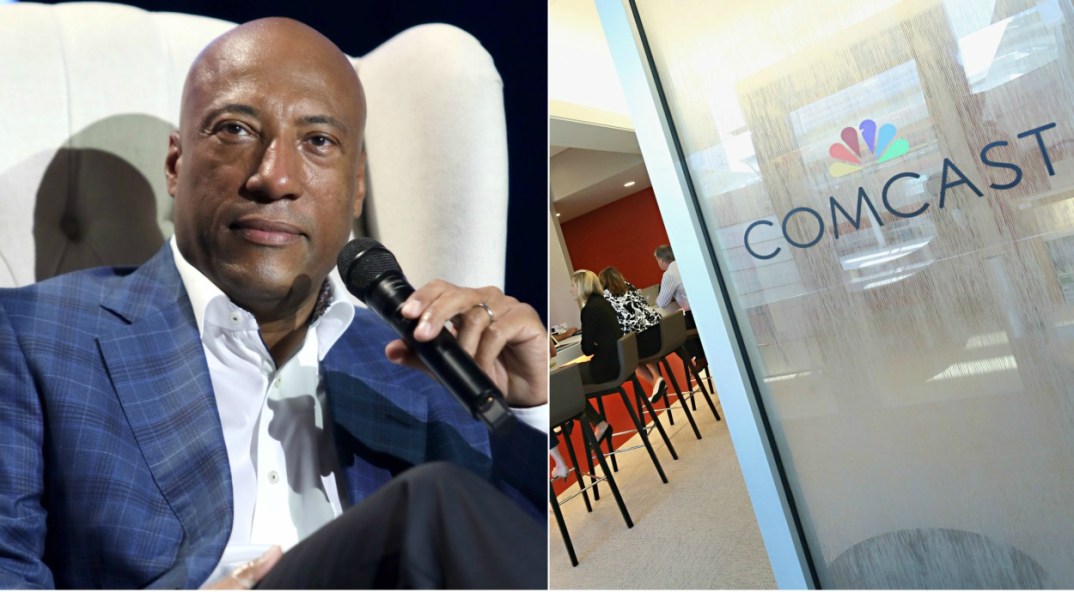Experts weigh in on Donald Trump, Comcast and civil rights
Scholars unpack why the president is interested in working with Comcast
It is said that politics makes strange bedfellows. An addendum to the old adage could be "that American racial politics particularly in regards to business makes for even stranger bedfellows." Such is the sentiment surrounding the recent alliance between President Donald Trump and the media giant Comcast.

It is said that politics makes strange bedfellows. An addendum to the old adage could be “that American racial politics particularly in regards to business makes for even stranger bedfellows.” Such is the sentiment surrounding the recent alliance between President Donald Trump and the media giant Comcast.
It is not secret that for years, Comcast and its newly acquired NBC Universal networks have had an interesting relationship with the POTUS.
A relationship built on what seems to be accountability, the left-leaning cable news channel MSNBC has been the proverbial thorn in the current administration’s side. Popular TV host such as Rachel Maddow, Joe Scarborough and Al Sharpton have brought to light some of the most discriminatory practices of the administration, and finding themselves star players in the president’s almost predictable early morning #FakeNews tweet fest. President Trump’s disdain for MSNBC and the politics espoused on the network has been well documented.
But then something happened to change his mind.
In mid August, Solicitor General Noel J. Francisco filed a 33-page amicus brief in the U.S. Supreme Court that not only soften his public opinion about this media goliath, but created a political alliance that could shift civil rights forever.
S. G. Fransico’s brief supports Comcast’s position in its $20 billion civil rights case, lead by Entertainment Studio’s Byron Allen. Allen’s lawsuit contends that Comcast has discriminated against him by not carrying his collective of cable channels. The case has found its way all the way up to the Supreme Court, with an upcoming hearing on Nov. 13. Both sides believe for very different reasons that whatever the decision is in this case (as noted in the brief), “may have repercussions for other federal anti-discrimination laws that the United States enforces or that apply to the federal government.”
Allen’s lawsuit was filed against Comcast in California under the Civil Rights Act of 1866 law. The over 150 year old law may seem dated or even archaic in some circles (after all America has witness its first African American president), but many scholars believe that an attack on this law will jeopardize the civil rights of people of color indefinitely.
The Civil Rights Act of 1866 was instituted after the end of slavery to ensure that African Americans have the same rights as whites, particularly as it pertains to business contracts. The Reconstruction-era law also protected newly freed Black people from abuse in the work place, as they were now legally entering into contracts with their former owners.
Read More: Supreme Court Justices tuning in to cable television civil rights lawsuit
According to the Philadelphia Inquirer, Drexel University professor from the Thomas R. Kline School of Laws said that “today very few people are openly racist, so they hide behind other reasons. A law that requires someone to say that race is the only reason for discrimination will be very hard to prove.”
“This is a [Supreme Court] that is very conservative and tends to rule against civil rights plaintiffs,” Cohen said. “So the Trump administration thinks it has a good chance of winning.”
The U.S. Chamber brief is pushing a narrative that the “mixed-motive” standard of the Ninth Circuit Court of Appeals in the Allen case “would invite tenuous allegations of discrimination and make it difficult to resolve cases on summary judgment, requiring fact-heavy trials into defendants’ subjective mindsets. Defendants would have strong incentives to settle even meritless claims simply to avoid these litigation costs.”
Almost ignoring the current climate of race in America, it seems as though the administration simply does not get it.
The Philadelphia Inquirer interviewed the dean of Berkeley Law at the University of California, Erwin Chemerinsky about his work on behalf of Allen’s claim, and his meeting with the DOJ last week. In his opinion, the agency and solicitor general have already “came in on the side of business and not civil rights.”
Chemerinsky will present Allen’s case before the Supreme Court in November. Maybe the courts will listen to the experts on this ruling.
